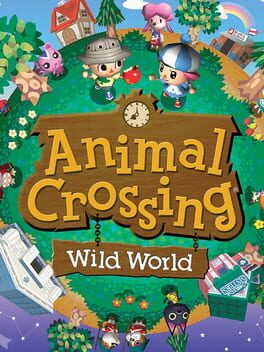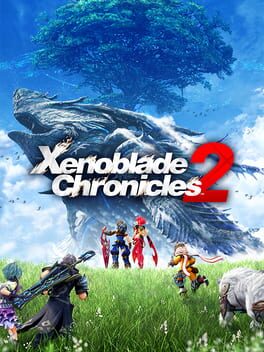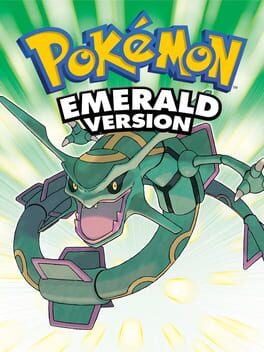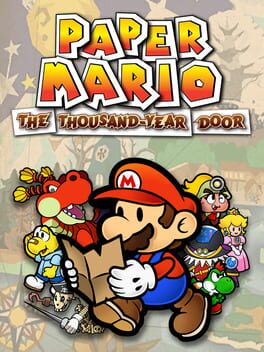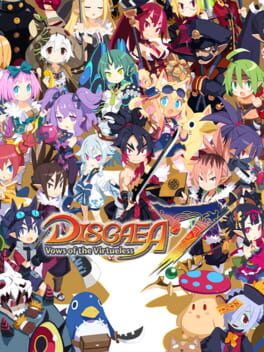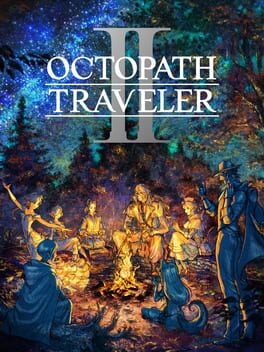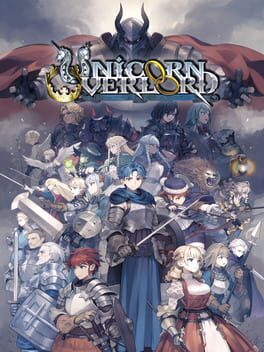aipom
Bio
Nothing here!
Badges

GOTY '23
Participated in the 2023 Game of the Year Event

GOTY '22
Participated in the 2022 Game of the Year Event

Shreked
Found the secret ogre page

Roadtrip
Voted for at least 3 features on the roadmap

Gone Gold
Received 5+ likes on a review while featured on the front page

3 Years of Service
Being part of the Backloggd community for 3 years

Liked
Gained 10+ total review likes

GOTY '21
Participated in the 2021 Game of the Year Event

Noticed
Gained 3+ followers
Favorite Games
064
Total Games Played
002
Played in 2024
021
Games Backloggd
Recently Played See More
Recently Reviewed See More
At its core, Unicorn Overlord features deep real-time strategy and tactical decision making that stays fresh for most of the game. Beautiful backdrops, music, and enough systems to keep managing your army interesting. Equipment not only affects your stats, but the abilities a character can use, a la Final Fantasy tactics. There are two currencies: Honor-- which you can spend on unit growth, and gold for buying items. Your army's Renown increases as you make a name for yourself by winning battles and restoring towns to their antebellum state, which in turn increases the maximum size of your units and applies a multiplier to the amount of honor and renown you earn. It's a satisfying loop.
Unicorn Overlord's call to fame is its tactics menu, which allows the player to set conditional statements for when each character's abilities trigger. This was a source of hours of fun for me. I would often stare at the tactics menu for a character for 20 minutes before getting on with the game. Once you land on a set of tactics that works, especially in the last quarter of the game when your characters have learned all of their abilities, then things can start feeling repetitive. Since the game shows you the outcome of each skirmish before the animation plays out (which I like), I found myself skipping the gorgeous visuals to get on with the larger fight.
Some of the other systems the game introduces felt clunky or misplaced. I didn't engage with the gift system at all, which did not impede my ability to gain rapport with my army. Stationing a guard at each liberated town nets you resources after each battle, which adds to the fun of the gameplay loop. But in order to station a guard at every town, you'd have to hire about 60 generic merceneries (as opposed to the "unique" main characters of the story). There is little reason to recruit them otherwise, as you certainly can't use that many characters in combat. And they just clog the same menu used to form units for battle.
Speaking of menus, I was constantly appreciative of how snappy, fluid, and beautiful the UI was in Unicorn Overlord. You're able to get a lot done with just a few button taps and in only a few seconds. That said, the equipment menu was a huge source of frustration. You cannot sort gear alphabetically. The most useful ways of sorting are usually by Order Acquired and by Not Eqipped. But as my inventory grew, I really wished I could sort alphabetically to find specific items-- especially since swapping equipment is such a key part of how battles play out.
I didn't find the story particularly interesting and I found the character designs somewhat lacking. The overworld sprites in particular were kind of odd and souless (and had different hair color than the character they were meant to represent?? Was that just me?).
I had fun with it despite these frustrations. I would recommend Octopath Traveler 2 or Triangle Strategy if the tactics system isn't for you but you still want the whole "build an army" thing. 13 Sentinels is still Vanillaware's best game.
Unicorn Overlord's call to fame is its tactics menu, which allows the player to set conditional statements for when each character's abilities trigger. This was a source of hours of fun for me. I would often stare at the tactics menu for a character for 20 minutes before getting on with the game. Once you land on a set of tactics that works, especially in the last quarter of the game when your characters have learned all of their abilities, then things can start feeling repetitive. Since the game shows you the outcome of each skirmish before the animation plays out (which I like), I found myself skipping the gorgeous visuals to get on with the larger fight.
Some of the other systems the game introduces felt clunky or misplaced. I didn't engage with the gift system at all, which did not impede my ability to gain rapport with my army. Stationing a guard at each liberated town nets you resources after each battle, which adds to the fun of the gameplay loop. But in order to station a guard at every town, you'd have to hire about 60 generic merceneries (as opposed to the "unique" main characters of the story). There is little reason to recruit them otherwise, as you certainly can't use that many characters in combat. And they just clog the same menu used to form units for battle.
Speaking of menus, I was constantly appreciative of how snappy, fluid, and beautiful the UI was in Unicorn Overlord. You're able to get a lot done with just a few button taps and in only a few seconds. That said, the equipment menu was a huge source of frustration. You cannot sort gear alphabetically. The most useful ways of sorting are usually by Order Acquired and by Not Eqipped. But as my inventory grew, I really wished I could sort alphabetically to find specific items-- especially since swapping equipment is such a key part of how battles play out.
I didn't find the story particularly interesting and I found the character designs somewhat lacking. The overworld sprites in particular were kind of odd and souless (and had different hair color than the character they were meant to represent?? Was that just me?).
I had fun with it despite these frustrations. I would recommend Octopath Traveler 2 or Triangle Strategy if the tactics system isn't for you but you still want the whole "build an army" thing. 13 Sentinels is still Vanillaware's best game.
Features some bold narrative choices that will stick with me for a long time. I hadn't played any other iteration of Persona 3 before this, and managed to avoid spoilers for over a decade. I'm grateful for that.
The voice acting performances were killer. I really enjoyed how each party member had their version of a social link (Life link) that led to a unique passive ability in combat. These were usually extremely strong and fun to take advantage of. They also clue you in to the character's optimal role in combat.
I have a list of minor complaints that frustrated me at least once:
1. The Full Moon battles should have involved a dungeon. Those encounters felt like they could have been fleshed out more.
2. I can't stand when there's an invisible damage cap on an enemy's health bar that triggers the next phase of a fight. When I spend time fusing strong Personas or optimizing my party, I appreciate the chance to steamroll bosses.
3. Some of the social links were flat-out boring. A lot of repetitive dialogue and lifeless gestures. Some of the social links should only have 5 ranks because those people just aren't interesting enough to warrant 10 cutscenes.
Again, the narrative of this game (the third act especially) is something I'll think about a lot. The finale took me by complete surprise and it was executed gently and perfectly.
The voice acting performances were killer. I really enjoyed how each party member had their version of a social link (Life link) that led to a unique passive ability in combat. These were usually extremely strong and fun to take advantage of. They also clue you in to the character's optimal role in combat.
I have a list of minor complaints that frustrated me at least once:
1. The Full Moon battles should have involved a dungeon. Those encounters felt like they could have been fleshed out more.
2. I can't stand when there's an invisible damage cap on an enemy's health bar that triggers the next phase of a fight. When I spend time fusing strong Personas or optimizing my party, I appreciate the chance to steamroll bosses.
3. Some of the social links were flat-out boring. A lot of repetitive dialogue and lifeless gestures. Some of the social links should only have 5 ranks because those people just aren't interesting enough to warrant 10 cutscenes.
Again, the narrative of this game (the third act especially) is something I'll think about a lot. The finale took me by complete surprise and it was executed gently and perfectly.
I don’t know where to fit this into the rest of the review, so let me just get this out of the way first: Yamai put this game on his back. One of the best new characters in gaming this decade. This guy is a REAL yearner. He loves dusty old women and wants you to know it.
Infinite Wealth is a prime example of how to use a sequel to make thoughtful improvements to a solid formula. The turn based combat has been retooled to give the player more control over unit positioning and areas of effect. The new job progression means less fussing over stat growth and encourages experimentation. The expanded social link system gives party members ample opportunity to display on-screen chemistry outside of the main story— enabling the player to buy into the game’s characterization of its protagonist as a man with an uncanny ability to unite people.
Speaking of Ichiban Kasuga, I don't think there's any doubt that he takes a backseat to Kiryu in this game. Despite Ichi being the new face of the series and having the torch passed to him in Yakuza 7, Infinite Wealth funnels all of its juicy character development and opportunities for true drama to the ol’ Dragon of Dojima. Who am I to complain, though? I loved every second of it. But it struck me as odd that Ichiban didn't get the same treatment. He has one opportunity to demonstrate true personal growth, and it’s played as a gag that sets him back to square one. He is made out to be a caricature— a cartoonish, idealistic hero. Meanwhile, Kiryu is portrayed more like a real human than ever before-- flaws and all.
With all of the thematic emphasis on closure and solidifying legacies, I’m surprised by how many loose ends Infinite Wealth leaves us with. In some ways, this makes the game feel like the second installment of a trilogy, which is fine. But in other cases, there were plot details simply left out or things that I would have liked to see fleshed out that probably never will be.
My final complaint is minor. There is a trophy for reaching level 70. After finishing all of the content in the game, my party was in the low 50s with few options for grinding. Outside of the achievement list, there is no reason to push the party past level 60. The hardest bosses in the game can be beaten far below that. The game’s most natural path to level 70 is locked behind paid DLC, which grants access to high level end-game dungeons.
I’m ultimately giving this game a slightly lower score than Gaiden. Gaiden didn’t have much to engage with outside of its extremely tight, well-told main story. Infinite Wealth, on the other hand, has engrossing side content that could warrant its own games. I was constantly entertained by a variety of activities. However, the weirdly paced story— despite many highlights— and mishandling of certain characters left me scratching my head at times. To me, no Yakuza game has managed to create the perfect blend of narrative and gameplay quite like Yakuza 0. But these two most recent entries have been thoroughly enjoyable nonetheless.
Infinite Wealth is a prime example of how to use a sequel to make thoughtful improvements to a solid formula. The turn based combat has been retooled to give the player more control over unit positioning and areas of effect. The new job progression means less fussing over stat growth and encourages experimentation. The expanded social link system gives party members ample opportunity to display on-screen chemistry outside of the main story— enabling the player to buy into the game’s characterization of its protagonist as a man with an uncanny ability to unite people.
Speaking of Ichiban Kasuga, I don't think there's any doubt that he takes a backseat to Kiryu in this game. Despite Ichi being the new face of the series and having the torch passed to him in Yakuza 7, Infinite Wealth funnels all of its juicy character development and opportunities for true drama to the ol’ Dragon of Dojima. Who am I to complain, though? I loved every second of it. But it struck me as odd that Ichiban didn't get the same treatment. He has one opportunity to demonstrate true personal growth, and it’s played as a gag that sets him back to square one. He is made out to be a caricature— a cartoonish, idealistic hero. Meanwhile, Kiryu is portrayed more like a real human than ever before-- flaws and all.
With all of the thematic emphasis on closure and solidifying legacies, I’m surprised by how many loose ends Infinite Wealth leaves us with. In some ways, this makes the game feel like the second installment of a trilogy, which is fine. But in other cases, there were plot details simply left out or things that I would have liked to see fleshed out that probably never will be.
My final complaint is minor. There is a trophy for reaching level 70. After finishing all of the content in the game, my party was in the low 50s with few options for grinding. Outside of the achievement list, there is no reason to push the party past level 60. The hardest bosses in the game can be beaten far below that. The game’s most natural path to level 70 is locked behind paid DLC, which grants access to high level end-game dungeons.
I’m ultimately giving this game a slightly lower score than Gaiden. Gaiden didn’t have much to engage with outside of its extremely tight, well-told main story. Infinite Wealth, on the other hand, has engrossing side content that could warrant its own games. I was constantly entertained by a variety of activities. However, the weirdly paced story— despite many highlights— and mishandling of certain characters left me scratching my head at times. To me, no Yakuza game has managed to create the perfect blend of narrative and gameplay quite like Yakuza 0. But these two most recent entries have been thoroughly enjoyable nonetheless.

